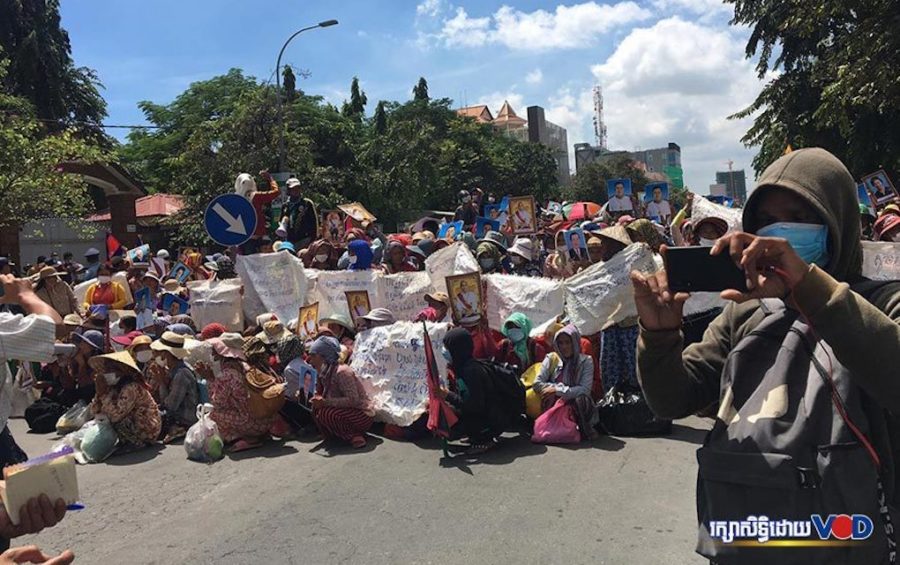Prime Minister Hun Sen urged the country to commit to protecting peace as hundreds of land disputants protested in Phnom Penh on Monday, saying that while they remain marginalized, threatened and “in tears,” the people don’t have peace.
Land protesters from the provinces of Koh Kong, Preah Sihanouk, Svay Rieng and Tbong Khmum blocked traffic in front of the Land Management Ministry for at least 20 minutes, with reporters estimating that as many as 1,100 people participated in the demonstration.
About 50 police officers and district security guards prevented the protesters from entering the ministry’s compound, and pushed them to the opposite side of the road. The protesters were later blocked from marching to Hun Sen’s house.
Sam Chamnan, from Tbong Khmum, said people in his village had lost community land to Harmony Win Investment over the past decade. Men Davy, from Svay Rieng, said she represented 152 families locked in a dispute with a Chinese company since 2014. Kan Chhorn, from Koh Kong, said his Sre Ambel district villagers had no land left to farm after 10 years fighting with a sugar plantation.
The villagers chose the International Day of Peace to protest so the government could finally fulfill its promise to bring peace to the country by resolving their disputes, Chamnan said.
But rather than peace, land protesters had been experiencing only arrests and threats, he said. “We have no rights,” Chamnan added.
Davy said it was time for the government to act rather than simply repeat the word “peace.”
“Today, I think Samdech will find a solution for people, in order to make our country have peace as it was promised,” she said, using an honorific for Hun Sen. “We think there’s no peace. There is only peace in their mouths because people are still in tears in all the provinces.”
Chhorn said he didn’t want to have to protest. “I am poor. … If I were rich, I wouldn’t come,” he said. “I’m a farmer but I don’t have the land to grow crops.”
City Hall spokesperson Met Measpheakdey said authorities had prevented people from marching to maintain public order and avoid traffic jams.
“They shouldn’t need to gather and disrupt public order” if the aim was simply to submit petitions, he said.
Meanwhile, to mark the International Day of Peace, Hun Sen recalled the country’s past struggles and said only peace could be the foundation for development.
“If we lose peace, we will lose everything. … Commit strongly to protecting the peace that we’ve just achieved,” he said in a letter issued on Saturday. “Endure, be strong and remain intact forever. Do not allow any reactionary force to destroy it at any cost.”
Acknowledging the economic challenges of the Covid-19 pandemic, Hun Sen said his two priorities were maintaining stability in politics and the microfinance sector.
The country’s microfinance debt hit $7.3 billion in June to more than 2 million borrowers, according to the Cambodia Microfinance Association, with an average microloan size of $3,804 that researchers have said is the highest in the world.
“The great achievements that Cambodia has achieved have never been applauded or praised by some superpowers and Western countries, which have a specific agenda to use Cambodia as a stepping stone to serve their political ambitions,” Hun Sen continued in his letter.
In a statement issued on Monday while protests were ongoing, the Land Management Ministry said about 800 disputants from Koh Kong had no legal basis for their complaints, rejecting their petition for intervention in disputes with sugar plantations Heng Huy, Koh Kong Plantation and Koh Kong Sugar Industry as well as Chinese-owned tourism resort Union Development Group.
UDG — a massive, $3.8-billion development that spans 45,000 hectares and 20 percent of Cambodia’s coastline — was sanctioned by the U.S. last week over alleged human rights abuses and forced evictions, following accusations that it could be turned into a Chinese military base.
(Translated and edited from the original article on VOD Khmer)












